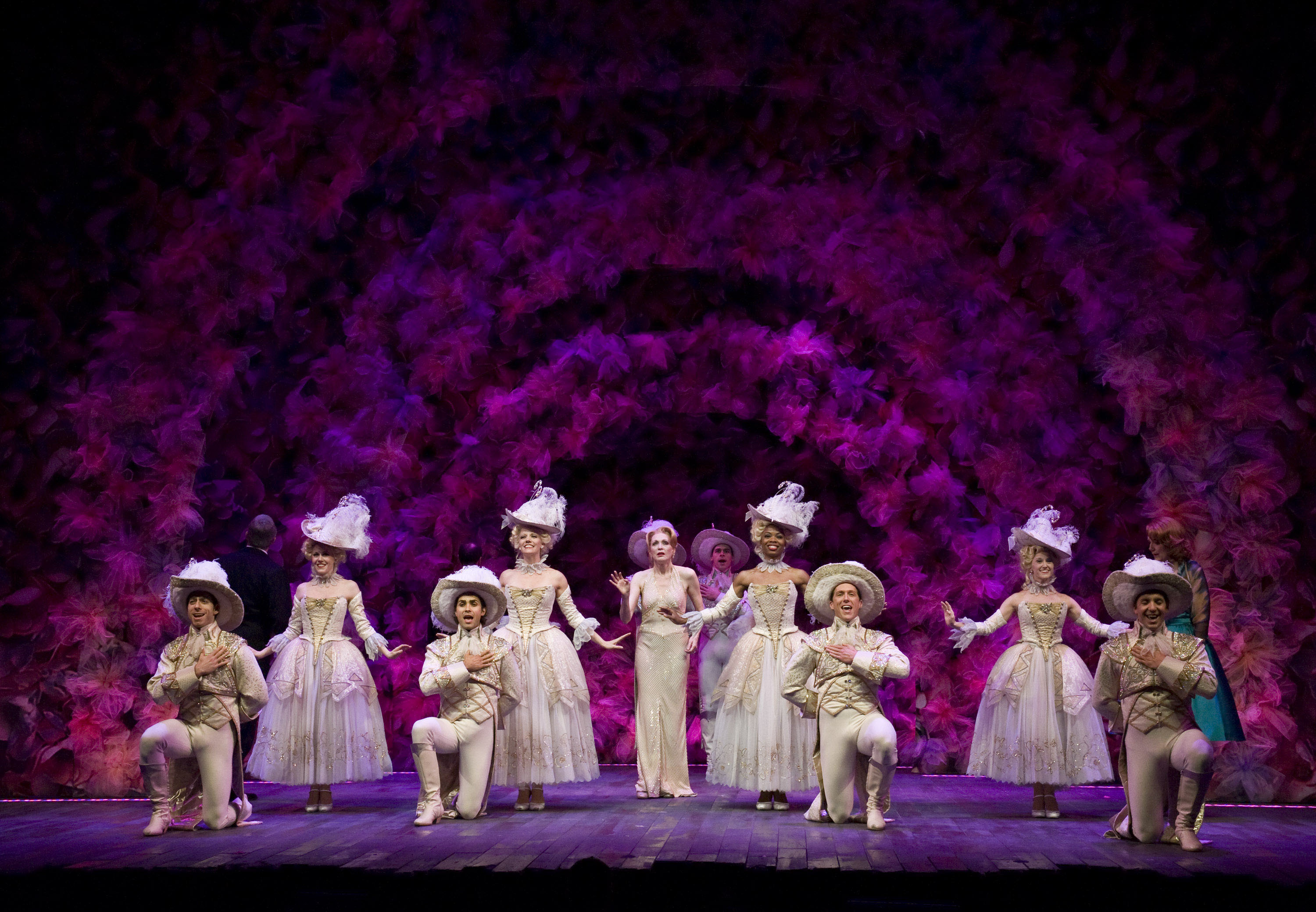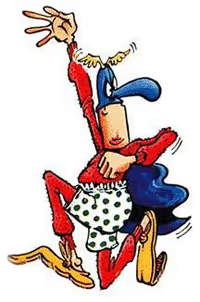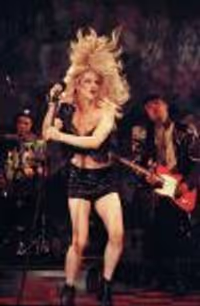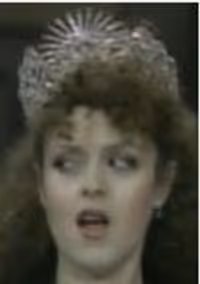FOLLIES- National Theatre Live
#150FOLLIES- National Theatre Live
Posted: 12/27/17 at 12:47am
Just like everyone on the entire planet, the main characters of Follies suffer from mental illnesses, and the show details the issue of coping with them, and the way that we, both interpersonally and culturally, are encouraged to suppress them or look the other way. Of course Sally has mental problems, she tried to commit suicide - framing that as being merely "unhappy and a little delusional" is disappointing. I agree that Staunton plays her too intense from the beginning but those aspects have always been present, not to mention underlined, highlighted, and in bold italics depending on the actor's interpretation.
rattleNwoolypenguin
Broadway Legend Joined: 10/11/11
#151FOLLIES- National Theatre Live
Posted: 12/27/17 at 5:27am
I really just loved how this was the first production where when you find out the leads have all been stepping out on each other that it's not like "ew what monstrous unlikable people" and more "wow. I really pity these people whose disillusionment and depression brought the worst out of them"
I've never felt so sad for the characters before this production. It's just tremendously sad throughout.
Guildenstern
Swing Joined: 12/30/15
#152FOLLIES- National Theatre Live
Posted: 12/27/17 at 11:29am
I enjoyed this production a great deal more than many of the other productions I have seen of this piece, especially the last two Broadway outings. However, I am not at all convinced of the idea that Sally is necessarily suffering from a mental illness, per se. She has always struck me as being a rather nervy, anxious woman who becomes an unpleasant drunk, with a good line in emotional blackmail and attention seeking. That really came over in Imelda Staunton's performance.
Young Sally threatens to kill herself, when Young Ben dumps her, maybe she does try and that is the one time but it all sounds more about self-dramatizing than a real threat, as Sally continues with it. The view of her, in this production's Losing My Mind, as a deserted, drunken woman strikes me as a pretty accurate, albeit appropriately glamorous and dramatic, portrayal of Sally's life, deserted and desperate for someone to pay her attention. Sad, pathetic, worthy of pity but not to be dismissed as 'mentally ill'.
#153FOLLIES- National Theatre Live
Posted: 12/27/17 at 11:40am
It's not a dismissal, and I think the text supports it. How she is described goes far beyond someone who is sad, unfulfilled, or regretful- to say nothing of her own actions. This is an opinion entirely divorced from any one particular performance- it is based on the written word of the libretto(s).
Guildenstern
Swing Joined: 12/30/15
#154FOLLIES- National Theatre Live
Posted: 12/27/17 at 1:03pm'Dismissal' is the wrong word, I admit, however, I'd suggest it is too pat a reading of a more complex character.
#155FOLLIES- National Theatre Live
Posted: 12/27/17 at 1:26pm
>> The Mind: [ Boggles ]
#156FOLLIES- National Theatre Live
Posted: 12/27/17 at 1:29pm
It's an aspect of her character that should be recognized and is a broader signal of a still persistent and troubling fear of the concept of mental illness, which is really damaging. My own mother fell into hard alcoholism after her divorce and it was very Sally in some ways, and if she'd been able to get help from a therapist or other professional I think it would've been done with much quicker and healthier. One of the show's huge themes is the hiding of reality behind a facade (I mean, really) and the kind of ruination and catastrophe that can be sown by spending your whole life maintaining it rather than facing some hard truths and trying, first and foremost, to be happy with yourself, rather than hoping for your partner to fulfill you, complete you, and make you happy.
Of course, it's not her whole character, but I think Sally is best served as a bellwether to the rest of the show, transforming from sort of pathetically quirky and nervous to really despairingly delusional. All of the characters have, essentially, the same problem, but Sally is the one who has the most trouble handling it in a socially acceptable way and is the most distressing of the four (which also provides a dramatic catalyst).
#157FOLLIES- National Theatre Live
Posted: 12/27/17 at 1:31pm
A character can be mentally ill and still complex. It doesn't diminish the richness of Sally as a character.
#158FOLLIES- National Theatre Live
Posted: 12/27/17 at 5:27pm
Thankfully my Mphil and Doctorate negates the need to plagiarize. Original content and contribution to the academy and all that jazz.
Sounds like you learned how to be a patronizing douchebag, but you didn't seem to understand how to use a contraction or the correct spelling of "fourth" (never mind the bizarre word salad run-on sentence that would only make sense coming from Trump's Twitter account). You might want to be a little more careful before throwing your education around as a sign of intellectual superiority. FYI...the use of "sweetie" doesn't actually make you sound smarter or superior. It's just not working.
Ask Santa for a dictionary.
The placement of that sentence is probably the most hilarious moment of hypocrisy I've seen on these boards in 2017. And that's counting political discussions with Trump defenders.
I was then attacked for this opinion though it had nothing controversial in it. I responded in the manner I was responded to.
Actually, you weren't "attacked" nor did you respond in the same manner. You just chose to reply with a condescending xenophobic response, but clearly, you'd rather be regarded as loathsome than intelligent.
A character can be mentally ill and still complex.
Except for Gizmo6, I think. The only complex thing I see about him is the unintelligible run-on sentence: "People kept looking to see were people in the audience around talking this brought the audience, the ones in the theatre and in the front rows, out of the world of the play."
#159FOLLIES- National Theatre Live
Posted: 12/28/17 at 12:00am
I'm not disputing that Kad can support
his diagnosis of Sally with evidence
from the book and lyrics. But one can
also treat Ibsen's Nora as if she were
a housewife from Encino; and I've read
the hundreds of undergrad papers to
prove it!
At some point, it is a choice to view
the theatrical world as a psycho-
therapist's office. Myself, I think
doing so lessens the theater ex-
perience, but I have the highest
respect for Kad and if he says he
sees FOLLIES that way, I accept
it as a legitimate interpretation.
As for Miss Staunton, having
seen her "Madame Rose", I
found her quite restrained in
FOLLIES. Yes, she has a few
over-the-top moments toward
the end, but they seemed well-
earned to me. Frankly, I was
much more baffled as to why
BEN was dallying with Sally
than why SALLY behaved as
she did with Ben. (It probably
doesn't help that Staunton is
simply not as attractive as
Collins, Vikki Carr, Victoria
Clark, Shani Wallace and the
other Sallys I've seen.)
Musicaldudepeter
Broadway Legend Joined: 3/18/10
#160FOLLIES- National Theatre Live
Posted: 12/28/17 at 10:08am
I thought the kiss between Quast and Staunton was disturbing and I couldn't for a second figure out why Ben would be even remotely attracted to Sally at that moment, and why the scene would build to that kiss. In fact Too Many Mornings didn't land quite the way it normally does, not least due in part to Staunton's terrible singing.
#161FOLLIES- National Theatre Live
Posted: 12/28/17 at 10:54am
This was actually the first time Too Many Mornings made some sense to me. He's reaching a breaking point with Phyllis and his private conversations with Sally remind him of the girl who was unconditionally (and unhealthily) devoted to him. He gets caught up in the feelings he had long forgotten and the Sally of the present becomes fused with the Sally of the past, which is why he kisses her. Her current appearance is completely irrelevant in the moment. He succumbs to her sense of nostalgia and chooses to briefly join her in reliving the past. What didn't work for me however, was how quickly it dissipated for him. I'd have to watch it again, but it seemed very abrupt and random. I could identify with Sally's confusion, but Ben's motivations were very unclear after the song. It was like when Trump forgets about what he tweeted the day before...a weird disconnect and denial.
#162FOLLIES- National Theatre Live
Posted: 12/28/17 at 1:24pm
Mister Matt said: "This was actually the first time Too Many Mornings made some sense to me. He's reaching a breaking point with Phyllis and his private conversations with Sally remind him of the girl who was unconditionally (and unhealthily) devoted to him. He gets caught up in the feelings he had long forgotten and the Sally of the present becomes fused with the Sally of the past, which is why he kisses her. Her current appearanceis completely irrelevant in the moment. He succumbs to her sense of nostalgia and chooses to briefly join her in reliving the past. What didn't work for me however, was how quickly it dissipated for him. I'd have to watch it again, but it seemed very abrupt and random. I could identify with Sally's confusion, but Ben's motivations were very unclear after the song. It was like when Trump forgets about what he tweeted the day before...a weird disconnect and denial."
Interesting analysis, Matt. I agree with the first part of what you said entirely - and yes, it was a bit confusing for me at that instant because I expected him to follow through that kiss with something else. But I later was okay with it because I took the moment of the kiss to essentially represent male orgasm - right before which nothing matters and you'd do anything to achieve it, and right after which you're essentially going to go through various elements like guilt, reclusiveness, and in this case - mild hostility.
Musicaldudepeter
Broadway Legend Joined: 3/18/10
#163FOLLIES- National Theatre Live
Posted: 12/28/17 at 2:32pm
There's an interesting letter from James Goldman written to Hal Prince during the rehearsal period for the original Follies, as quoted in Ted Chapin's book which cleared up that Ben/Sally scene for me - he writes "For Ben, Sally represents unfinished business. It's not the lady herself who attracts him and evokes old feelings. It's the past within himself that he has never faced or come to terms with."
#164FOLLIES- National Theatre Live
Posted: 12/28/17 at 3:45pm
For me, that statement still doesn't make sense in terms of the scene because Sally's presence IS the catalyst for his facing the past. There is no reason to believe he'd suddenly become introspective if she weren't there. I get what he's saying, but like his problematic book, it's not clearly stated. I think he relies WAY too much on the director to communicate his story (I didn't like Lion in Winter, either).
#165FOLLIES- National Theatre Live
Posted: 12/28/17 at 3:50pm
But I later was okay with it because I took the moment of the kiss to essentially represent male orgasm - right before which nothing matters and you'd do anything to achieve it, and right after which you're essentially going to go through various elements like guilt, reclusiveness, and in this case - mild hostility.
Not to mention a big one...shame, which is probably what they were going for, I would imagine. I just didn't see a connection. Regardless, the flip side of the male orgasm is just as common: contentment, bliss, joy, relief, obsession, addiction and even love.
#166FOLLIES- National Theatre Live
Posted: 12/28/17 at 9:25pm
Mister Matt said: "For me, that statement still doesn't make sense in terms of the scene because Sally's presence IS the catalyst for his facing the past. There is no reason to believe he'd suddenly become introspective if she weren't there. I get what he's saying, but like his problematic book, it's not clearly stated. I think he relies WAY too much on the director to communicate his story (I didn't like Lion in Winter, either)."
Well, back in the day, when you
collaborated with Prince or Bennett--
much less both--it was more or
less a given that the director's
contribution was as central as
the script.
For those who didn't see it, in
the original Ben was holding
Young Sally in his arms, while
Sally mimed being held and
kissed a few feet away. The
moment made me gasp out
loud and was more powerful
than anything in the script
(which I normally defend).
#167FOLLIES- National Theatre Live
Posted: 12/30/17 at 3:18am
I saw the show live last night - will post about it when I get a chance (I really enjoyed it and thought several aspects did improve upon the last revival, although at the same time I found myself deeply missing the previous revival at points).
I never take photos of shows but just wanted to share a photo I took of the set after the show - I personally thought the base set (i.e., the crumbling theatre, with the rubble/run-down wall pieces, seats and lighting fixtures) to be absolutely breath taking. And the atmosphere created by that spotlight in the background is just awesome! Has Follies ever looked this good?
Jarethan
Broadway Legend Joined: 2/10/11
#168FOLLIES- National Theatre Live
Posted: 12/30/17 at 10:58am
IMO, Boris Aronson is the greatest stage designer in my lifetime, and Follies was his masterpiece, though there was stiff competition for that title. The original production design was incredible, with platforms rolling in and out to create private scenes. Loveland was spectacular.
Gizmo6
Broadway Star Joined: 6/16/17
#169FOLLIES- National Theatre Live
Posted: 12/30/17 at 11:19am
I’ve always criticized the person but to attack someone’s alleged mental health is the lowest of the low.
To stigmatize people in that respect needs deep reflection I hope you are capable of.
Mental health diagnoses are varied and whether you dislike me or not there is no need to attack someone’s alleged disability.
#170FOLLIES- National Theatre Live
Posted: 12/31/17 at 6:11am
Some thoughts about seeing the show (at least based on the performance I saw, I haven’t seen the recording and I don’t know if things are consistent). I’ll often compare to the most recent revival:
Things I Liked
Staunton’s acting performance – for me she perfectly gets what I think the character should be about. I would describe it as a similar take to Bernadette’s with similar interpretations of many of the key songs, a similar trajectory of the character and generally emphasising the neurotic nature of the character. She is a little bit stronger of an actor than Bernadette, so even though the overall performance “in qolbinau’s eyes” had a similar vision to Bernadette, the execution of some of the line readings seems a little bit smoother than Bernadette’s at times.
Some of the key differences I noticed between her and Bernadette’s performance:
- There were different choices made for how they entered. Staunton really played up the idea that she was genuinely excited to be there – she couldn’t control her excitement, while also alternating with some nervous/anxious facial expressions to start to ‘plant the seed’ that perhaps there was more going on here. In contrast, Bernadette walked on slowly and took in the atmosphere – she didn’t seem as excited in that moment as she did overwhelmed to be back. You could tell this and the events that were to unfold were very important and emotional for her. When Bernadette repeated “I’m so glad I came” I began to wonder if she was trying to convince herself of this, as if she wasn’t sure yet and something uneasy might happen – whereas Staunton genuinely couldn’t wait for the events of the nights to unfold.
- Besides perhaps the entrance, I actually thought Imelda’s Sally seemed more desperate than Bernadette’s. When she spoke to Phyllis for the first time it felt to me like Imelda really didn’t have that much interest in Phyllis – and was just going through the motions with her until she could find out if Ben was there or not. With Bernadette, I did feel there was at least some chemistry between her and Phyllis and she was enjoying the moment, and it was only when she found out Ben was there that she then tried to withhold her emotional reaction to this.
- The way Imelda interpreted most of the songs I would say was similar to Bernadette, although they approach “Don’t Look At Me” in a completely different way. People always complain that there was no arc to Bernadette’s Sally (perhaps because of the entrance), but they seem to forget that when Bernadette first met Ben she was incredibly excited and playful with “Don’t Look At Me” (with perhaps an undertone of anxiety). In contrast, I thought Imelda’s “Don’t Look At Me” was more channelling into her anxiety of seeing him for the first time rather than being genuinely playful/enjoying the moment.
As mentioned, I loved the set design/staging and thought it improved on the revival in many ways. Unlike the previous revival, this show felt less like a bare stencil. It had aesthetically pleasing and interesting set pieces that would also be used in different ways throughout the show. The 2011 revival did often feel like people would just stand centre bare stage and deliver their lines/songs. With the turntable and different set pieces (e.g., the seats that would be moved to the centre) this show actually felt like it had different scenes happening and I guess just generally I felt like there was more going on. There were some very distinct choices to the staging that greatly improved the clarity of the text. For example, having “I’m Still Here” start singing directly to the people around her made it completely clear that this was not the song she was just speaking about in the lead up to the song – which I know has definitely confused people in the past based on discussions on this forum. In another example, having the young Phyllis in “Lucy & Jesse” is an incredibly effective way to make it clear what the song is about. Some people have wondered whether she is singing about her and Sally rather than her younger self.
The Phyllis started off a little shakey I thought, cracking notes and having awkward use of head voice but really nailed “Could I Leave You?” and “Lucy & Jesse”. I thought it was interesting that at the end of “Could I Leave You” her “guess” wasn’t just screamed like other recent Phyllis’, but a rather emotional cry – which made it absolutely clear that yes she COULD leave him, but doesn’t actually want to. Seems a lot less ambiguous than how I’ve seen the show interpreted in the past. That said, it was hard not to miss Jan Maxwell as points. The way Jan said “I had a lover once, his name was…….” (silence) was SO FUNNY. This actress completely missed this.
The usual songs that work, worked – “One More Kiss” was just breathtaking and heartbreaking. There is something about having someone that is clearly at the end of their life sing this song so beautifully (even better than the 2011 revival) accompanied by their younger self. “Who’s That Woman” continues to be a show stopper – and I don’t know when this became a thing but having the sassy black Stella continues to greatly add value!
I found Ben’s Breakdown to be particularly impactful in this production (although it takes far too long to get there – his song is so boring! I wish Sondheim would cut a verse from this). In the 2011 revival it was much more subtle – and an audience member if they didn’t know any better might wonder if the actor is having a breakdown or just forgetting his lines (at first). The way they did it here made it much clearer what was going on, I thought – and I liked how they cut the singing and there was awkward silence. And it was interesting how the chorus didn’t really know what to do so some of them started singing (I’ll get onto this, but there were quite a lot of subtle differences to the text and I’m not sure if these are the ‘original’ or not).
The structure – was great to see the show without an intermission. I think it should stay this way – there just isn’t really a point to break the show. Maybe after “Who’s That Woman” would be better. Also, I don’t ever want to see show without the Rain on the Roof/Ah Paris/Broadway Baby trio. It was so exciting to see them restore this in the 2011 first Broadway preview, and I think it’s important to thematically link these songs together or to me it seems a bit confusing/pointless why they are being sung (especially the first two, which are rather non-substantial).
Things I’m mixed or neutral about:
The Loveland sets/onwards. I mean, they were ‘fine’ but there was just something about the last revival. After a drab couple of hours, we were suddenly blinded with overwhelmingly vivid colours. It was an absolute spectacle. In this revival, it’s all rather underwhelming and I don’t find the washed out colours particularly appealing. Look at the last revival:
Although overall I thought the sets/staging was more interesting here, the 2011 revival had a dark, eerie atmosphere with the eerie/dark/bleak lighting, uneven/broken boarding at the end of the stage etc.. I kind of miss that.
The costumes of the last revival were I thought much more interesting, glamorous, vivid colourful. In this revival, it seems like they are going for perhaps more of the pastel look of the period. But it’s much more boring.
Due to a combination of staging choices, costumes (and perhaps my bias towards Bernadette as a star) I thought this production was much more of an ‘ensemble piece’ than a star vehicle for (e.g., Bernadette). People will probably think this a good thing, but I kind of liked that the last revival seemed to be set up for Bernadette.
I don’t know the different iterations of the text closely enough to understand their origins, but it felt like there were dozens of small textual changes (mostly to neutral effect) (maybe my memory is hazy). It would be good to understand where these come from. Who changed Parking Lot to Office Building? I thought Parking Lot is funnier because it’s so not a glamorous thing to replace a theatre with.
RE: comments about laughter when Sally tells Ben she is ready to get married in the last revival – in this production there was a small chuckle but the timing of the line is not set up well to get a laugh (and I wonder if the text might be slightly different here). It all goes very quickly while in the last revival everything was much slower and gives time for audience reactions.
The “I should have died the first time” Sally lines at the end were very jarringly, awkwardly confronting and really change the tone of the ending of the show. It’s SO bleak. Like, there is just absolutely no hope for that couple – Buddy was literally carrying Sally off the stage. I know this is probably controversial, but I almost prefer the more subtle approach that makes the ending slightly less depressing in the 2011 revival.
It is hard not to acknowledge and recognise what an absolute stand-out lead and supporting cast they had in the last revival – It’s hard to forget Jayne Houdyshell, Elaine Paige, Danny Burstein, Jan Maxwell etc.
Things I didn’t like
Staunton’s singing. It didn’t really matter for “Don’t Look at Me” and “Losing My Mind” was surprisingly effective (probably because her belt/lower register is pretty decent). However, “In Buddy’s Eyes” and “Too Many Mornings” were absolute train wrecks. I just find it absolutely laughable that anyone could ever think Staunton is a better singer than Bernadette. Just listen to Bernadette’s incredibly beautiful head voice in “In Buddy’s Eyes” with her long, sustained powerful notes – and (to a lesser extend but there still) “Too Many Mornings”. Bernadette is a professional singer. Staunton sounded like she was a teenage girl trying to learn how to sing. The difference is even more remarkable and pathetic when you compare Staunton to someone like Victoria Clark. I will definitely not give Staunton a free pass for this – I found “In Buddy’s Eyes” to be especially disappointing. And it’s my favourite song in the show.
#171FOLLIES- National Theatre Live
Posted: 1/1/18 at 5:54pm
Kad said: "It's nota dismissal, and I think the text supports it. How she is described goes far beyond someone who is sad, unfulfilled, or regretful- to say nothing of her own actions. This is an opinion entirely divorced from any one particular performance- it is based on the written word of the libretto(s)."
Kad, I've already admitted
my respect for your views
and I agree the text can
support a diagnosis of
BPD for Sally.
But doing so eliminates
her agency, because--as
you point out--one can't
help a mental illness (be-
yond resorting to what-
ever pharmacology is
available in one's era).
FOLLIES, however, is
all about the choices we
make and our inability
to move past the conse-
quences of those actions.
If Sally refuses to move on
from the lost "love of her
live" (not unlike Buddy),
THAT's a choice. If she is
merely born too soon for
Prozac, why is she even
in this particular play?
To take another example,
one can make a case
that the VIRGINIA WOOLF
text supports a diagnosis
of George and Martha as
psychotics caught in a
shared delusion. But is
that the more interesting
interpretation? I would
argue no.
JBC3
Broadway Star Joined: 4/9/17
#172FOLLIES- National Theatre Live
Posted: 1/1/18 at 6:56pm
Follies is an ensemble-oriented show so the balance here, especially in bringing the play to the forefront as Staunton said director Dominic Cooke emphasized, is what really made it work I think. I wonder if some of the magic of this production results from it being the first musical he has directed.
#173FOLLIES- National Theatre Live
Posted: 1/1/18 at 7:46pm
^^^ I don't know about that. Prince
and Bennett had done little BUT
musicals when they staged the
original.
But I am impressed. In my ex-
perience, British play directors
doing their first musical do not
have a great track record.
Guildenstern
Swing Joined: 12/30/15
#174FOLLIES- National Theatre Live
Posted: 1/2/18 at 4:34am
I've no doubt there are some glorious disasters - John Gielgud, springs to mind - but for directors not known for musical theatre work, Messrs. Daldry, Ockrent, Pimlott and Mendes might disagree. I'm not sure it's a hard and fast rule.
Videos






